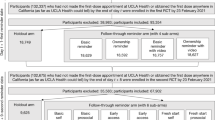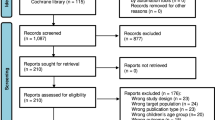Abstract
Latinx populations have unique barriers to HPV vaccination. In the current study, we assessed the effectiveness of an online intervention to increase HPV vaccination intentions among patients of clinics that principally serve a Latinx population (n = 85%) as part of a randomized control trial (RCT). Participants viewed on an iPad either an individually tailored educational website (CHiCOS) or untailored information derived from the Vaccine Information Sheet (VIS) for HPV. Vaccination intention and related covariates were assessed via survey items administered before (pre-test) and after (post-test) viewing the material. No statistically significant differences were seen in changes of intention to vaccinate between groups (N = 1294). However, 16% of all (tailored and untailored combined) participants increased in their intention to vaccinate, while 7% decreased in intention. Overall 72% of participants had high intentions to vaccinate, yet far fewer actually received a vaccine dose. The current study explores implications of the demonstrated intention-behavior gap. As such, it presents opportunities to improve future interventions—specifically those that employ tailored messaging.

Similar content being viewed by others
References
American Cancer Society. (2018). Cancer Facts & Figures| Hispanics-Latinos | American Cancer Society. American Cancer Society. https://www.cancer.org/research/cancer-facts-statistics/hispanics-latinos-facts-figures.html
Barrera, M., Castro, F. G., Strycker, L. A., & Toobert, D. J. (2013). Cultural adaptations of behavioral health interventions: A PROGRESS REPort. Journal of Consulting and Clinical Psychology, 81, 196–205. https://doi.org/10.1037/a0027085
Boersma, P., & Black, L. (2020). Human Papillomavirus Vaccination Among Adults Aged 18−26, 2013−2018 (No. 354; NCHS Data Brief). National Center for Health Statistics. https://www.cdc.gov/nchs/products/databriefs/db354.htm
Britt, R. K., & Hatten, K. N. (2013). Need for cognition and electronic health literacy and subsequent information seeking behaviors among university undergraduate students. SAGE Open, 3, 2158244013508957. https://doi.org/10.1177/2158244013508957
Centers for Disease Control and Prevention (CDC). (2013). Vaccine Information Statement | HPV. https://www.cdc.gov/vaccines/hcp/vis/vis-statements/hpv.html
Davis, R. E., & Resnicow, K. (2011). The cultural variance framework for tailoring health messages. In H. Cho (Ed.), Health communication message design: Theory and practice (pp. 115–136). SAGE Publications Inc.
Dempsey, A. F., Fuhrel-Forbis, A., & Konrath, S. (2014). Use of the Carolina HPV immunization attitudes and beliefs scale (CHIAS) in young adult women. PLoS ONE, 9, e100193. https://doi.org/10.1371/journal.pone.0100193
Dempsey, A. F., Maertens, J., Sevick, C., Jimenez-Zambrano, A., & Juarez-Colunga, E. (2019). A randomized, controlled, pragmatic trial of an iPad-based, tailored messaging intervention to increase human papillomavirus vaccination among Latinos. Human Vaccines & Immunotherapeutics. https://doi.org/10.1080/21645515.2018.1559685
Dunne, E. F., Unger, E. R., Sternberg, M., McQuillan, G., Swan, D. C., Patel, S. S., & Markowitz, L. E. (2007). Prevalence of HPV infection among females in the United States. JAMA: The Journal of the American Medical Association, 297, 813–819. https://doi.org/10.1001/jama.297.8.813
Dunne, E. F., Nielson, C. M., Stone, K. M., Markowitz, L. E., & Giuliano, A. R. (2006). Prevalence of HPV infection among men: A systematic review of the literature. The Journal of Infectious Diseases, 194, 1044–1057. https://doi.org/10.1086/507432
Dutta, M. J. (2007). Communicating about culture and health: Theorizing culture-centered and cultural sensitivity approaches. Communication Theory, 17, 304–328.
Elling, S., Lentz, L., & de Jong, M. (2007). Website Evaluation Questionnaire: Development of a research-based tool for evaluating informational websites. In M. A. Wimmer, J. Scholl, & Å. Grönlund (Eds.), Electronic Government (pp. 293–304). Springer.
Gilkey, M. B., Calo, W. A., Moss, J. L., Shah, P. D., Marciniak, M. W., & Brewer, N. T. (2016). Provider communication and HPV vaccination: The impact of recommendation quality. Vaccine, 34, 1187–1192. https://doi.org/10.1016/j.vaccine.2016.01.023
Henry, K. A., Stroup, A. M., Warner, E. L., & Kepka, D. (2016). Geographic Factors and Human Papillomavirus (HPV) Vaccination Initiation among Adolescent Girls in the United States. Cancer Epidemiology, Biomarkers & Prevention, 25, 309–317. https://doi.org/10.1158/1055-9965.EPI-15-0658
Jemal, A., Ward, E. M., Johnson, C. J., Cronin, K. A., Ma, J., Ryerson, A. B., Mariotto, A., Lake, A. J., Wilson, R., Sherman, R. L., Anderson, R. N., Henley, S. J., Kohler, B. A., Penberthy, L., Feuer, E. J., & Weir, H. K. (2017). Annual Report to the Nation on the Status of Cancer, 1975–2014, Featuring Survival. JNCI Journal of the National Cancer Institute, 109(9). https://doi.org/10.1093/jnci/djx030
Joo, J. Y., & Liu, M. F. (2021). Culturally tailored interventions for ethnic minorities: A scoping review. Nursing Open, 8, 2078–2090. https://doi.org/10.1002/nop2.733
Kreuter, M. W., & McClure, S. M. (2004). The role of culture in health communication. Annual Review of Public Health, 25, 439–455.
Lechuga, J., Vera-Cala, L., & Martinez-Donate, A. (2016). HPV vaccine awareness, barriers, intentions, and uptake in Latina women. Journal of Immigrant and Minority Health/center for Minority Public Health, 18, 173–178. https://doi.org/10.1007/s10903-014-0139-z
Lieu, T. A., Ortega-Sanchez, I., Ray, G. T., Rusinak, D., Yih, W. K., Choo, P. W., Shui, I., Kleinman, K., Harpaz, R., & Prosser, L. A. (2008). Community and patient values for preventing Herpes Zoster. PharmacoEconomics, 26, 235–249. https://doi.org/10.2165/00019053-200826030-00006
Lustria, M. L. A., Noar, S. M., Cortese, J., Stee, S. K. V., Glueckauf, R. L., & Lee, J. (2013). A meta-analysis of web-delivered tailored health behavior change interventions. Journal of Health Communication, 18, 1039–1069. https://doi.org/10.1080/10810730.2013.768727
Maertens, J. A., Jimenez-Zambrano, A. M., Albright, K., & Dempsey, A. F. (2017). Using community engagement to develop a web-based intervention for Latinos about the HPV vaccine. Journal of Health Communication, 22, 285–293. https://doi.org/10.1080/10810730.2016.1275890
Markowitz, L. E., Dunne, E. F., Saraiya, M., Chesson, H. W., Curtis, C. R., Gee, J., Bocchini, J. A., & Unger, E. R. (2014). Human Papillomavirus Vaccination: Recommendations of the Advisory Committee on Immunization Practices (ACIP) (Morbidity and Mortality Weekly Report). Centers for Disease Control and Prevention. https://www.cdc.gov/mmwr/preview/mmwrhtml/rr6305a1.htm
McRee, A.-L., Gilkey, M. B., & Dempsey, A. F. (2014). HPV vaccine hesitancy: Findings from a statewide survey of health care providers. Journal of Pediatric Health Care, 28, 541–549. https://doi.org/10.1016/j.pedhc.2014.05.003
Murphy, S. T., Frank, L. B., Chatterjee, J. S., & Baezconde-Garbanati, L. (2013). Narrative versus nonnarrative: The role of identification, transportation, and emotion in reducing health disparities. Journal of Communication, 63, 116–137.
Murphy, S. T., Frank, L. B., Chatterjee, J. S., Moran, M. B., Zhao, N., Amezola de Herrera, P., & Baezconde-Garbanati, L. A. (2015). Comparing the relative efficacy of narrative vs nonnarrative health messages in reducing health disparities using a randomized trial. American Journal of Public Health, 105, 2117–2123. https://doi.org/10.2105/AJPH.2014.302332
Nikoloudakis, I. A., Crutzen, R., Rebar, A. L., Vandelanotte, C., Quester, P., Dry, M., Skuse, A., Duncan, M. J., & Short, C. E. (2018). Can you elaborate on that? Addressing participants’ need for cognition in computer-tailored health behavior interventions. Health Psychology Review, 12(4), 437–452. https://doi.org/10.1080/17437199.2018.1525571
Noar, S. M., Benac, C. N., & Harris, M. S. (2007). Does tailoring matter? Meta-analytic review of tailored print health behavior change interventions. Psychological Bulletin, 133, 673–693. https://doi.org/10.1037/0033-2909.133.4.673
O’Connor, A. M. (1995). Validation of a decisional conflict scale. Medical Decision Making, 15, 25–30. https://doi.org/10.1177/0272989X9501500105
Petty, R. E., & Cacioppo, J. T. (1986). The elaboration likelihood model of persuasion. In Communication and persuasion (pp. 1–24). Springer.
Pingali, C., Yankey, D., Elam-Evans, L. D., Markowitz, L. E., Williams, C. L., Fredua, B., McNamara, L. A., Stokley, S., & Singleton, J. A. (2021). National, regional, state, and selected local area vaccination coverage among adolescents aged 13–17 Years—United States, 2020. MMWR. Morbidity and Mortality Weekly Report, 70. https://doi.org/10.15585/mmwr.mm7035a1
Rahman, M., Laz, T. H., McGrath, C. J., & Berenson, A. B. (2015). Provider recommendation mediates the relationship between parental human papillomavirus (HPV) vaccine awareness and HPV vaccine initiation and completion among 13- to 17-year-old US adolescent children. Clinical Pediatrics, 54, 371–375. https://doi.org/10.1177/0009922814551135
Rimer, B. K., & Kreuter, M. W. (2006). Advancing tailored health communication: A persuasion and message effects perspective. Journal of Communication, 56, S184–S201.
Rosenstock, I. M. (1974). The health belief model and preventive health behavior. Health Education Monographs, 2, 354–386. https://doi.org/10.1177/109019817400200405
Satterwhite, C. L., Torrone, E., Meites, E., Dunne, E. F., Mahajan, R., Ocfemia, M. C. B., Su, J., Xu, F., & Weinstock, H. (2013). Sexually transmitted infections among US women and men: Prevalence and incidence estimates, 2008. Sexually Transmitted Diseases, 40, 187. https://doi.org/10.1097/OLQ.0b013e318286bb53
Schiffman, C. (1994). Ethnovisual and sociovisual elements of design: Visual dialect as a basis for creativity in public service graphic design. Journal of Visual Literacy, 14, 23–39. https://doi.org/10.1080/23796529.1994.11674494
Sharma, P., Zargar-Shoshtari, K., Pettaway, C. A., Schabath, M. B., Giuliano, A. R., & Spiess, P. E. (2016). Disparities in penile cancer. Cancer Control, 23, 409–414. https://doi.org/10.1177/107327481602300412
Sniehotta, F. F., Scholz, U., & Schwarzer, R. (2005). Bridging the intention–behaviour gap: Planning, self-efficacy, and action control in the adoption and maintenance of physical exercise. Psychology & Health, 20, 143–160. https://doi.org/10.1080/08870440512331317670
Sonawane, K., Zhu, Y., Montealegre, J. R., Lairson, D. R., Bauer, C., McGee, L. U., Giuliano, A. R., & Deshmukh, A. A. (2020). Parental intent to initiate and complete the human papillomavirus vaccine series in the USA: A nationwide, cross-sectional survey. The Lancet Public Health, 5, e484–e492. https://doi.org/10.1016/S2468-2667(20)30139-0
Thomas, S. B., Fine, M. J., & Ibrahim, S. A. (2004). Health disparities: The importance of culture and health communication. American Public Health Association.
van der Weijden, T., Légaré, F., Boivin, A., Burgers, J. S., van Veenendaal, H., Stiggelbout, A. M., Faber, M., & Elwyn, G. (2010). How to integrate individual patient values and preferences in clinical practice guidelines? A Research Protocol. Implementation Science, 5, 10. https://doi.org/10.1186/1748-5908-5-10
Walker, T. Y., Elam-Evans, L. D., Yankey, D., Markowitz, L. E., Williams, C. L., Mbaeyi, S. A., Fredua, B., & Stokley, S. (2018). National, Regional, State, and Selected Local Area Vaccination Coverage Among Adolescents Aged 13–17 Years—United States, 2017. MMWR. Morbidity and Mortality Weekly Report. https://doi.org/10.15585/mmwr.mm6733a1
Williams-Piehota, P., Schneider, T. R., Pizarro, J., Mowad, L., & Salovey, P. (2003). Matching health messages to information-processing styles: Need for cognition and mammography utilization. Health Communication, 15, 375–392.
Witte, K. (1994). Fear control and danger control: A test of the extended parallel process model (EPPM). Communication Monographs, 61, 113–134. https://doi.org/10.1080/03637759409376328
Funding
This work was funded by the Patient Centered Outcomes Research Institute (PCORI ID 1455). The opinions expressed in this manuscript do not necessarily reflect those of the funding agency.
Author information
Authors and Affiliations
Corresponding author
Ethics declarations
Competing interests
All of the authors listed attest that they have no competing interests nor conflicts of interest to disclose.
Human and Animal Rights and Informed Consent
The study was registered on ClinicalTrials.gov. All study activities were approved by the institutional review board. All participants completed informed consent documentation prior to data collection.
Additional information
Publisher's Note
Springer Nature remains neutral with regard to jurisdictional claims in published maps and institutional affiliations.
Supplementary Information
Below is the link to the electronic supplementary material.
Rights and permissions
Springer Nature or its licensor holds exclusive rights to this article under a publishing agreement with the author(s) or other rightsholder(s); author self-archiving of the accepted manuscript version of this article is solely governed by the terms of such publishing agreement and applicable law.
About this article
Cite this article
Reno, J.E., Sevick, C., Maertens, J. et al. Is tailored messaging more effective? An analysis of a digital health intervention to promote HPV vaccination intent among Latinx. J Behav Med 46, 335–345 (2023). https://doi.org/10.1007/s10865-022-00340-3
Received:
Accepted:
Published:
Issue Date:
DOI: https://doi.org/10.1007/s10865-022-00340-3




